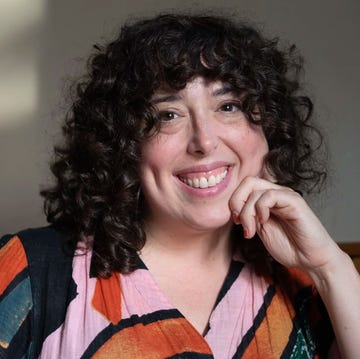The morning after the 2024 election, I texted a close friend who, like me, has devoted her academic career to questions involving speech, law, and technology: “The internet—a mistake??” She wrote back immediately: “Huge mistake.”
After reading Vauhini Vara’s new essay collection, Searches: Selfhood in the Digital Age, I suspected she shared our misgivings. In Searches, Vara, who has lived many lives in just a few decades—Wall Street Journal reporter, New Yorker editor, finalist for a Pulitzer Prize for her first novel—reflects on her experiences with digital technology and its effects on her life and the lives of others. To Vara, the internet and related technologies seem a strange quicksilver, constantly reshaping our society and her own existence. As technology companies proliferate, run by technical geniuses who often seem indifferent to or dismissive of their products’ consequences, Vara consistently applies her own deliberate curiosity to the implications of innovation. Crucially, she brings a gimlet eye, sharpened by her journalism background, to the enthusiastic claims of technology evangelists.
But Vara never descends into cynicism; she unsurprisingly retains an open-minded perspective, given her firsthand experience of how the internet can shape one’s life in profound ways. Vara muses on the paradox of an infinitely creative generative AI system facilitated by data extraction (citing the work of scholars like Safiya Umoja Noble and Shoshana Zuboff). She situates her candid photographs and the rise of Instagram amid the history of artistic representations of human lives, reminiscing about how her predigital photos of her teenage years attempted to capture something “beautifully impermanent” about the people in her life.
Perhaps every young person sees their socialization and maturation as reflected in the world’s revolutions, but millennials have a powerful justification for that well-worn claim. We lived through many digital innovations in our formative years. The refractions of Vara’s experiences through Silicon Valley’s mind-bending inventions serve as the primary throughline of Searches. Vara uses Google Translate and a few AI tools to pen an essay, in Spanish with a parallel English translation, about her year in Madrid and the misperceptions she experienced with her interlocutors. “According to others, when I speak Spanish I seem less intelligent than I am,” Vara laments. Only by referring to Searches’ “Notes on Process” do we learn that Vara has “written” this entire English section by running her Spanish original through Google Translate. Both texts have the fingerprints of digital interventions, and Vara deftly confounds our expectation about which is “original.”
Vara’s use of technology to interrogate her own lived experiences proves fruitful. The centerpiece of Searches and the most famous of Vara’s experiments, “Ghosts,” consists of a series of dialogues with OpenAI’s ChatGPT to generate texts describing the untimely death of Vara’s older sister from Ewing’s sarcoma during her undergraduate years and its aftereffects on Vara. Initially published in 2021 in the Believer—a lifetime ago in the evolution of AI—“Ghosts” succeeds owing to its eerie simplicity, which remains bracing even as we have grown wearily accustomed to the hype of artificial intelligence.
“Ghosts” punctures the dull AI rhetoric precisely because of the strangeness of the oddly moving and yet overwrought short fiction that GPT-3 produces in response to Vara’s increasingly lengthy prompts requesting that it describe her reaction to her sister’s illness. AI invents banal details—a nonexistent 1978 run across America (four years before Vara’s birth) to raise cancer awareness, a clichéd false flirtation with a college professor—but in doing so, it grazes emotional truths.
Vara describes an invented yet profound AI-generated memory of her sister taking her hand while they drove home from the beach where, Vara has told GPT-3, she had wanted her ashes spread. Vara marvels, “Here was as nuanced and profound a reference to embodiment as I’d ever read. Artificial intelligence had succeeded in moving me with a sentence about the most devastating experience of my life. If it could write that sentence, what else could it write?”
Perhaps because of its power in “Ghosts,” Vara often revisits the concept of remixing her own perspective with those produced by technological tools, to more mixed effect. She periodically feeds her chapters into an AI engine to generate reactions and responses—a move that seems forced rather than provocative, as it effectively buries her insights in long sections of unremarkable AIspeak.
Similar difficulty arises in another experiment that plays with perspectives other than her own: Searches’ final chapter features crowdsourced content responding to specific prompts. (“What do you know about the lives of the people—maybe parents, maybe not—who raised you?” “Tell me about a secret desire—yours or someone else’s.”) That maneuver muddies rather than clarifies Vara’s singular view on the interrelation between technology, emotion, and experience. We hear from anonymous strangers in decontextualized blocks (individual speakers cannot be easily identified), which gives the effect of an unmediated social media feed rather than the clarity that Vara’s voice exemplifies in Searches’ most engaging passages. If Vara wanted to highlight how, like ChatGPT, she could generate content from other people’s creativity, that point fails to meaningfully register.
When some of Vara’s experiments fell short, I couldn’t help but recall the simplicity of Searches’ most powerful moments, chief among them a reproduced, casually candid photo of her late sister at college, sitting in front of a messy dorm-room desk and bed, staring kindly into the lens. “It sometimes occurs to me that we need to publish more photos of my sister if we want a good record of her to exist online after the rest of us are gone,” Vara notes, with a keen lack of adornment. In the face of all the technology, Searches’ least mediated observations remain its most haunting.•
G S Hans is a clinical professor of law at Cornell Law School, where he directs the Civil Rights and Civil Liberties Clinic.













